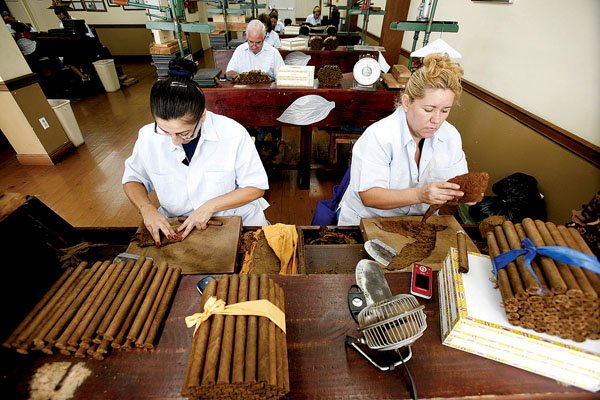SAN JOSE DE LAS LAJAS, Cuba — Cuban rum maestro Jose Navarro's taste buds sing when he sips Havana Club, the sweet spirit distilled in this farming town south of the capital.
"It has to be Cuban," said Navarro, the oldest of the island's nine certified rum experts. "Havana Club can't exist anywhere else."
But another Havana Club does exist, one made by Bermuda-based rum giant Bacardi Ltd. A variety of Cohiba cigars, once rolled exclusively for Fidel Castro, is produced by Swedish Match North America of Virginia, and a Miami firm offers its own version of Cubita, a top Cuban coffee.
Washington's 47-year-old trade embargo has kept Cuban products out of the U.S. - but hasn't prevented companies from using the communist island's brand names.
As the U.S. and Cuba consider better ties, such trademark issues would have to be settled before any easing of the embargo. The fight between Bacardi and the Cuban government for the Havana Club name already has played out in the U.S. courts and Congress for more than a decade - and is now before Spain's high court.
But the battles are about so much more than brand names. They are charged with 50 years of emotion over Fidel Castro's 1959 revolution and expropriation of private companies as he implemented socialism. They are also rooted in the future as U.S. corporations face the specter of new competition from Cuban products, which may carry a special allure after being banned for nearly a half-century.
"There are U.S. interests thinking about how they are going to be affected by an influx of Cuban products, and the outlook is not always positive," said Jake Colvin, director of the Washington-based USA Engage, which opposes the embargo.
Americans craving all things Cuban already can buy products inspired by the Caribbean island - just not made there.
Bacardi's Havana Club is an 80-proof rum that has sold in Florida since 2006, and sales have been so strong it's thinking of expanding the label to other states, said spokesman Patricia M. Neal.
Even though Cuba's Havana Club rum can't be sold in the U.S., the Cuban government still sued Bacardi for using the name.
Bacardi argues it owns the name because the original Havana Club was expropriated by Castro from its Cuban producers, the Arechabala family, which went into exile.
Bacardi bought the name and recipe from the Arechabalas in 1997.
Cuba says it registered the Havana Club trademark in the U.S. in 1976 after the Arechabalas let their claim on it expire. It has sold the rum internationally since 1993 in a joint partnership with French spirits consortium Pernod Ricard.
So far the U.S. courts have sided with Bacardi on the basis of a 1998 federal law that prevents the registration or renewal of U.S. trademarks tied to companies nationalized by the Cuban government. Cuba has appealed its most recent case to the U.S. District Court of Appeals in Washington.
Meanwhile, Cuba's Havana Club is winning abroad. A Bacardi suit filed in a Spanish court against the Cuban government and Pernod Ricard over the trademark in that country was thrown out in 2007. Bacardi, too, has appealed, and the case is before the Spanish Supreme Court.
The true argument is over who can claim to produce authentic Cuban rum - especially if the country opens up to global commerce.
Bacardi, a family-owned spirits conglomerate founded in Santiago, Cuba, in 1862, pioneered the light, dry Cuban rum it is now famous for, devising a charcoal-filter system and aging in oak barrels for added sweetness.
But the Bacardis joined the fiercely anti-Castro exile community in Miami after Castro nationalized the company in 1960. Havana Club, like most of Bacardi rums, is made in Puerto Rico - and says so on the bottle.
The thought of competing with Cuba is already keeping executives at Swedish Match North America up nights. The Richmond, Va.-based company owns General Cigar Inc., which has sold Dominican Republic made Cohiba cigars in the U.S. since 1997.
"It's not the brand that's going to make the difference; it's whether it's Cuban or not," said Gerry Roerty, the company's vice president and general counsel. And smokers are willing to pay a premium for Cuban, he said.
Cohiba was founded in Cuba to make cigars for Castro and visiting dignitaries. Today it is the flagship of 27 premium brands produced by Habanos, equally owned by the government and Madrid-based Altadis SA, which was acquired last year by Britain's Imperial Tobacco Group PLC.
Cuba never registered its version of Cohibas in the United States but still sued General Cigar. The U.S. Supreme Court sided with General Cigar, which has factories in the Dominican Republic and Honduras and produces versions of signature Cuban brands Partagas, Hoyo de Monterrey, Bolivar and Punch. It also makes the La Gloria Cubana, Rico Habano and Havana Honeys brands, which despite their names are unknown on the island.
U.S. industry estimates show 85 million Cuban cigars could be shipped to the U.S. annually in a post-embargo world, cutting into profits for U.S. companies that sell about 255 million premium cigars a year.
Roerty said not only would General Cigar face a trademark war, but the company also would not have access to Cuban tobacco leaves or other raw materials to match its new competitors.
Some say the forbidden-fruit factor around Cuban cigars and other products won't last if the embargo vanishes.
Still, most U.S. aficionados are anxious to get their hands on real Cubans.
At Havana Connections, a cigar shop in suburban Richmond - General Cigar's own backyard - mention of Cubans sparked an hour-long discussion.
"When you smoke, it's taste. And the Cuban seed and Cuban cigar - they're smoother and creamier," said 60-year-old Dan Tater, a smoker for about a quarter-century.
"There's got to be something to that lore that this is really a better cigar."
Business, Pages 29, 34 on 08/29/2009
